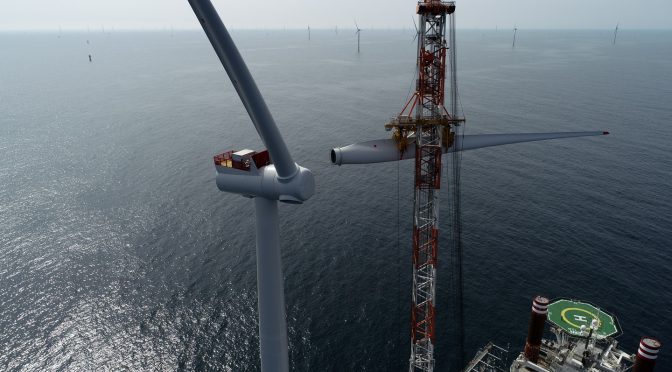Ørsted has today announced that the final of 174 wind turbines has been installed at the world’s largest offshore wind farm Hornsea 1. The component loadout took place at Siemens Gamesa Renewable Energy’s factory in Hull, where the majority of blades were constructed, and the components were then transported 120km out to sea.
The
wind turbines were transported by two specialist vessels: The Bold
Tern, owned by Fred. Olsen Windcarrier, and DEME Group’s Sea Challenger.
Both are installation vessels which jack up in the sea to provide a
sturdy base for lifting.
Four wind turbines were loaded on to the
vessel each time. The main components are a steel tower, three turbine
blades and a nacelle which houses all generation components for the wind
turbine. On average, it takes around 12 hours of precision working to
install a turbine in full.
Standing a proud 190m above sea level and
with its three 75m long blades, each 7 MW wind turbine will be able to
power a UK home for over a day with each single rotation.
Part of an
impressive array dotted over 407 km2 of North Sea more than 100 km from
the Yorkshire coast, the final turbine completes the 174-strong array of
wind turbines, which make up the world’s largest offshore wind farm.
Now
the final wind turbine is installed, the wind power project will
undergo a period of commissioning, and will be officially inaugurated in
2020 as the world’s largest offshore wind farm.
First wind farm to cross 1GW capacity
Once
complete, the site will be the world’s first offshore wind farm to be
able to generate over 1GW of electricity – enough to power well over one
million UK homes.
Duncan Clark, Ørsted Programme Director for
Hornsea 1 said: “The milestone of this last turbine being installed only
nine months after the first one was erected is just one small part of
this record-breaking project. Hornsea 1 has truly paved the way for the
next generation of offshore wind farms.
He continued: “At the time of
taking on the wind energy project, it’s scale and the technical
pioneering required seemed a Herculean challenge, but a truly
extraordinary effort from all those involved have managed to make this
impressive feat of engineering the new norm.
“We have benefitted from
fantastic working relationships with contractors and suppliers, and
that includes vessel providers who have maintained a constant stream of
communication to ensure that turbine installation has been concluded on
time and within budget.”
8,000 people
Offshore
construction started in January 2018, when the first monopile foundation
was installed by GeoSea’s installation vessel, Innovation. It has taken
a whole host of contractors, suppliers and Ørsted employees to reach
this landmark with over 8,000 people having been inducted to work
offshore at Hornsea 1’s site.
Due to the distance from shore, the
offshore construction team based themselves on site, 120km out to sea,
to help ensure the project kept safe and to schedule in dynamic weather
conditions.
Living on board the GMS Endeavour for two weeks at a
time, they were able to stay close to the action, as well as enjoy a
gym, catered for, laundry service and high-speed internet.
Facts about Hornsea 1
Hornsea 1 is the world’s biggest offshore wind farm with a capacity of
1.2GW, nearly double the current world’s largest offshore wind farm,
Walney Extension.
The wind farm comprises 174 Siemens Gamesa 7MW
turbines (190m from sea level with 75m long blades) and will be capable
of powering well over one million UK homes.
At 120km from shore, it’s the furthest from shore an offshore wind farm has ever been built.
Hornsea 1 features the longest ever AC offshore wind export cable with a total length of 467 km.
Three 400MW offshore substations will convert to high voltage the clean
electricity from the medium voltage cables connected to each wind
turbine.
Hornsea 1, which will cover an area of 407 square km, is
50/50 joint venture between Ørsted A/S and Global Infrastructure
Partners (GIP).

